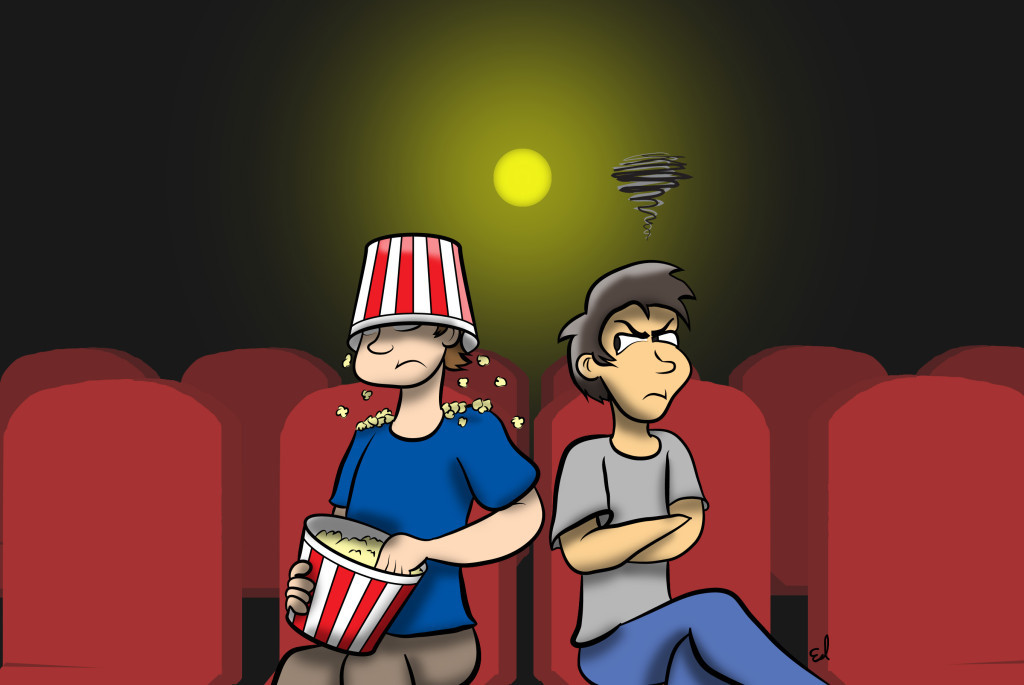
A communication crutch
By Elliot Chan, Staff Writer
The wonderful world of entertainment has created a fictional place we can all live in. Sadly though, the matrix of our lives takes place not with Neo, but in the real world.
It might seem contradictory arguing against movie and television references by using one myself, but I just wanted to give an example of their effectiveness—or lack thereof. A big mistake is assuming everybody has the same taste and entertainment memory as you do. Since Seinfeld ended and The Simpsons did whatever it did, there hasn’t been a television show I could reference to get my exact point across. I try to stay well versed, watching a little of this and a little of that so I can hold my own in conversations, but few others do. Most are committed to a couple of television shows and a limited number of movies. Oftentimes, I use a quote and end up explaining the concept of the scene, the characters, and even the whole program itself.
But worse than having to explain a reference is having to listen to someone else explain one. “Have you seen the episode of the Big Bang Theory where…?” And I stare at them, my eyes glazed over as they try to paint the picture of Leonard doing something that resembles the situation we’re currently in. It’s unsettling watching a crowd happily discuss a television show you have no interest in or haven’t caught up on. You simply stand at the perimeter, lacking interest or fearful that your show will be ruined.
Similar to telling someone about your dream, referencing a movie the other person hasn’t seen isn’t even worth talking about. Sure, it can be a nice detour from the normal small talk of weather, traffic, and work, but like most detours, it’s only used when something is already broken: the conversation.
Getting a cheap laugh by referencing a Family Guy or South Park episode seems like fun, but the truth is it shows people your limited creativity. There are people at parties who are the centre of attention merely for memorizing Peter Griffin quotes, but nobody really cares about those people or finds them interesting.
If you want to reference something, make sure the person you are speaking to knows about it beforehand. If they don’t, don’t bother explaining it, because the magic is already lost. There is plenty to talk about, so don’t go on and on trying to describe the blonde guy from Clerks. You know… urgh… what’s his name? You know, you’ve seen it right? Let’s move on.
[hr]
References are a necessity
By Eric Wilkins, Staff Writer
“Or are you here to tell me what a bad eugoogoolizer I am?”
“A what?”
“A eugoogoolizer… one who speaks at funerals.”
Those lines are from the immortal Zoolander, the deep and thought-provoking movie that takes a serious look into the harsh world of male modelling. It’s a great movie that everyone has seen and loved, and those who haven’t should hop to it right away.
And this brings us to the point I have yet to mention: there’s nothing wrong with bringing up movie and TV references in conversation. In fact, one could comfortably argue that they’re integral to maintaining an interesting exchange.
The current age is one that is very much in touch with visual entertainment. Movies and TV shows are constantly being downloaded and watched on laptops, PVRs are filled to capacity with fresh episodes, and cinemas still manage to get people through the doors and in front of yet another motion picture. If there’s anything that this generation knows, it’s those magical images that play across our various viewing platforms.
With that in mind, it should come as no real surprise that a common way to relate to others is through TV and movie tastes. And that leads to—you guessed it—references. Whether it’s a direct quote or a quick parody, people can, do, and should work references into conversations. They liven up chats by providing imagery and even shared emotions that were experienced whilst watching the show or movie. They add a whole other dimension to a chat. Why plug away in 2-D when you can have 3-D?
Not everyone will get every allusion, seeing how despite the tendency to have watching habits that border on fanatic, it’s impossible to see everything. But that’s a good thing. “What you talkin’ ‘bout, Willis?” No, really, it is. In an effort to keep up with your tastes/movie lingo, people will often check it out for themselves. Assuming it’s a half-decent program, such people will have expanded their horizons for the better and added another conversational tool to their arsenal. It shouldn’t be seen as an annoyance when the movie-specific joke that has everyone else howling goes clear over your head; it should be seen as a welcome opportunity to see something new and worthwhile.
“That’s gold, Jerry! Gold!” I know, I know. While not everyone will always share your choice in programs, you can take consolation in the fact that you tried. Also, seriously reconsider if they’re worth being friends with if they have any issues whatsoever with a classic like Seinfeld.



